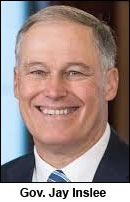NEWS ROUNDUP
Swedish safety ● IAM sues NLRB ● Flawed I-976 ● $0 taxes for FedEx
Monday, November 18, 2019
LOCAL
► From KING 5 — Swedish nurses, health care workers vote to strike — Union nurses and health care workers at Swedish Medical Center announced that they have voted Friday to authorize a strike. Health care workers from SEIU Healthcare 1199NW, Washington State Nurses Association and UFCW 21 at Swedish Medical Center and other Providence-owned hospitals shared their concerns about patient care and working conditions at their facilities.
► From Q13 Fox — Swedish nurses, healthcare workers vote to authorize strike — “We know that we haven’t had the time to sit down and actually talk with our patients about what’s going on. It means that we wake up in the middle of the night with anxiety, that we think of something we may have forgotten,” said union negotiating team member Betsy Scott.
 ► In the NW Labor Press — Jury says ILWU owes $93 million for dock slowdown — In a decision that threatens the survival of the International Longshore and Warehouse Union, a federal jury Nov. 4 held the union responsible for economic harm caused by a sustained and intentional dockworker slowdown at Port of Portland Terminal 6, and recommended that the national union and Portland-based Local 8 be ordered to pay $93.6 million to ICTSI, the Philippine-owned company that formerly operated the terminal. The jury held Local 8 responsible for $42 million of the damages (45%). Local 8’s assets total $151,000. The ILWU international, with assets totaling $8 million, is responsible for the remaining $51 million.
► In the NW Labor Press — Jury says ILWU owes $93 million for dock slowdown — In a decision that threatens the survival of the International Longshore and Warehouse Union, a federal jury Nov. 4 held the union responsible for economic harm caused by a sustained and intentional dockworker slowdown at Port of Portland Terminal 6, and recommended that the national union and Portland-based Local 8 be ordered to pay $93.6 million to ICTSI, the Philippine-owned company that formerly operated the terminal. The jury held Local 8 responsible for $42 million of the damages (45%). Local 8’s assets total $151,000. The ILWU international, with assets totaling $8 million, is responsible for the remaining $51 million.
► In the NW Labor Press — Business owners call the union: We want in — It’s not every day an employer calls a union to talk about signing up. But that’s what happened at Hamer Electric in Longview and both the company owners and the union officers of IBEW Local 48 are celebrating a combination they believe will make both sides stronger.
 ► In the Columbian — Former Clark College president discriminated against women, investigation finds — Former Clark College President Bob Knight engaged in inappropriate, discriminatory behavior against women, and particularly women of color, during his tenure at the Vancouver community college. That’s according to an investigatory report provided to The Columbian on Friday in response to a public records request, which highlights details of Knight’s offensive comments, as well as his interference in the hiring process of a permanent vice president of Diversity, Equity and Inclusion.
► In the Columbian — Former Clark College president discriminated against women, investigation finds — Former Clark College President Bob Knight engaged in inappropriate, discriminatory behavior against women, and particularly women of color, during his tenure at the Vancouver community college. That’s according to an investigatory report provided to The Columbian on Friday in response to a public records request, which highlights details of Knight’s offensive comments, as well as his interference in the hiring process of a permanent vice president of Diversity, Equity and Inclusion.
► In today’s Columbian — Adjunct faculty seek stability, outnumber full-time instructors at Clark College — Adjunct professors trying to make a career in education often piece together a patchwork of classes at colleges throughout the region, making a few thousand dollars working part time at any given college in any given quarter.
► From Crosscut — Seattle’s film unions push back against City Hall’s new ‘creative economy’ strategy — A coalition of more than 2,000 film and music professionals say they feel like an afterthought in the city’s plans.
BOEING
 ► From Bloomberg — Boeing ruling prompts Machinists Union to sue federal labor board — The Machinists union sued the National Labor Relations Board alleging the agency exceeded its authority when it overturned a unionization vote by Boeing Co. workers in South Carolina. The workers voted to join the International Association of Machinists in a 2018 election, but the NLRB subsequently reviewed the matter and ruled that the workers didn’t have enough in common to participate in the same election and join the same unit within the IAM. The holding came in a 3-1 decision, with the board’s lone Democrat dissenting.
► From Bloomberg — Boeing ruling prompts Machinists Union to sue federal labor board — The Machinists union sued the National Labor Relations Board alleging the agency exceeded its authority when it overturned a unionization vote by Boeing Co. workers in South Carolina. The workers voted to join the International Association of Machinists in a 2018 election, but the NLRB subsequently reviewed the matter and ruled that the workers didn’t have enough in common to participate in the same election and join the same unit within the IAM. The holding came in a 3-1 decision, with the board’s lone Democrat dissenting.
► In the Seattle Times — Boeing abandons its failed fuselage robots on the 777X, handing the job back to machinists — After enduring a manufacturing mess that spanned six years and cost millions of dollars as it implemented a large-scale robotic system for automated assembly of the 777 fuselage, Boeing has abandoned the robots and will go back to relying more on its human machinists. Boeing said Wednesday it is reverting to an older approach that “has proven more reliable, requiring less work by hand and less rework, than what the robots were capable of.”
► In the PSBJ — Lawmakers propose $25M federal campaign to address aerospace worker shortage (subscription req’d) — U.S. Rep. Rick Larsen (D-WA-2nd) led a group of bipartisan lawmakers that introduced a bill Friday providing for a $25 million campaign to promote careers in aerospace and other transportation sectors.

► In the Seattle Times — Boeing’s fix tames the ‘tiger’ in the 737 MAX flight controls, say experts and critics — After months of intense scrutiny, even some of the harshest critics of the 737 MAX’s flight-control system believe Boeing’s software fix will prevent a recurrence of the scenarios that killed 346 people in the crashes in Indonesia and Ethiopia.
► In the Seattle Times — As Boeing’s 737 MAX nears a return to service, will flyers return to it? — The latest version of Boeing’s bestselling workhorse faces a potential consumer backlash as its return to flight looms closer.
► In the Seattle Times — Watchdog paints troubling picture of relationship between NASA and Boeing — A report by NASA’s inspector general paints a damning picture of the space agency’s relationship with Boeing, one of its top contractors, saying NASA “overpaid” Boeing by hundreds of million of dollars.
► From the AP — Airbus nails $30B in new plane orders at Dubai Airshow
THIS WASHINGTON
 ► In the Seattle Times — Was the language voters saw on their ballots for Initiative 976 wrong? Sure seems like it. (by Danny Westneat) — The ballot said the measure would repeal the “authority to impose certain vehicle taxes and fees,” thereby limiting “annual motor-vehicle-license fees to $30, except voter-approved charges.” The plain language of the phrase “except voter-approved charges,” in the context of a measure to cut car tabs, could mean only one of two things: That the vote wouldn’t affect existing voter-approved car-tab fees. Or that voters would be able to raise car tabs in the future if they wanted to. But I-976 both repeals voter-approved car tabs and also blocks voters from considering them going ahead.
► In the Seattle Times — Was the language voters saw on their ballots for Initiative 976 wrong? Sure seems like it. (by Danny Westneat) — The ballot said the measure would repeal the “authority to impose certain vehicle taxes and fees,” thereby limiting “annual motor-vehicle-license fees to $30, except voter-approved charges.” The plain language of the phrase “except voter-approved charges,” in the context of a measure to cut car tabs, could mean only one of two things: That the vote wouldn’t affect existing voter-approved car-tab fees. Or that voters would be able to raise car tabs in the future if they wanted to. But I-976 both repeals voter-approved car tabs and also blocks voters from considering them going ahead.
► In the (Everett) Herald — Voters spoke, but I-976 must get court review (editorial) — Since 1998, Eyman has put 17 measures before the voters; six were rejected in elections, and 11 were approved. But of those 11, eight were overturned fully or partially in court, including his first $30 license tab measure, I-695, approved by the voters in 1999… Eyman and his supporters are wrong to claim that (legal challenges are) a case of I-976’s opponents simply not liking the outcome of the election. I-695 warrants scrutiny on these constitutional issues because so much is at stake.
► In the (Everett) Herald — Cities start to deal with the fallout of I-976 — Without the revenue car tabs brought in projects and road maintenance are likely to be postponed.
► In the Columbian — I-976 puts Vancouver’s street projects in jeopardy
 ► In the News Tribune — Jay Inslee bragged about it to America. Can Washington’s new public option stand up to hype? (editorial) — Movers and shakers of American healthcare are watching Washington, the first state to enter the individual insurance market with a public option to compete against the private marketplace. Or at least a quasi-public option… If America’s final destination is a healthcare system with lower costs and broader access, this watered-down version of a public option may help us get there. But we’d best buckle up. It could be a bumpy ride.
► In the News Tribune — Jay Inslee bragged about it to America. Can Washington’s new public option stand up to hype? (editorial) — Movers and shakers of American healthcare are watching Washington, the first state to enter the individual insurance market with a public option to compete against the private marketplace. Or at least a quasi-public option… If America’s final destination is a healthcare system with lower costs and broader access, this watered-down version of a public option may help us get there. But we’d best buckle up. It could be a bumpy ride.
► In today’s Oregonian — Inslee, Oregon governor will meet Monday to talk Interstate Bridge
THAT WASHINGTON

► In the LA Times — Trump’s plan to ‘save’ Medicare would actually destroy it (by Michael Hiltzik) — Trump has signed an executive order purportedly designed to “protect and improve” the program. Here’s the truth of the matter: Trump’s executive order is a stealth attack on the very program he’s swearing to protect. Buried within the order is a provision that would destroy Medicare by driving its costs to an unsustainable level. At the same time, Trump is proposing to turn more of the program over to commercial insurers. Put simply, he’s proposing to privatize Medicare.
ALSO at The Stand — Trump executive order aims at privatizing Medicare
 ► In the WSJ — Fewer jobless Americans tap unemployment benefits — Fewer jobless Americans are relying on unemployment insurance amid tighter state rules on obtaining the benefits and a strong job market. The share of jobless people receiving unemployment benefits fell after the 2007-09 recession and has stagnated at a historically low level since. Last year, 28% of jobless people received benefits, down from 37% in 2000 — a period of similarly low unemployment. Among the main reasons, experts say: After the last recession ended, state legislatures passed policies reducing unemployment benefits and tightening eligibility requirements.
► In the WSJ — Fewer jobless Americans tap unemployment benefits — Fewer jobless Americans are relying on unemployment insurance amid tighter state rules on obtaining the benefits and a strong job market. The share of jobless people receiving unemployment benefits fell after the 2007-09 recession and has stagnated at a historically low level since. Last year, 28% of jobless people received benefits, down from 37% in 2000 — a period of similarly low unemployment. Among the main reasons, experts say: After the last recession ended, state legislatures passed policies reducing unemployment benefits and tightening eligibility requirements.
► From The Hill — House passes Ex-Im Bank reboot bill opposed by White House, McConnell — The House on Friday passed a bill along party lines to fund and overhaul the Export-Import Bank after a bipartisan agreement crumbled under Democratic opposition.
IMPEACHMENT
 ► From Politico — Majority of Americans support ousting Trump from office, new poll shows — Seventy percent of Americans believe Trump was wrong to pressure Ukraine’s leader to pursue probes into his political opponents, according to a new survey, and more than half of respondents believe he should be removed from office. An ABC News/Ipsos poll published Monday found that 51 percent of those surveyed think Trump should be impeached by House lawmakers, as well as convicted in a Senate trial.
► From Politico — Majority of Americans support ousting Trump from office, new poll shows — Seventy percent of Americans believe Trump was wrong to pressure Ukraine’s leader to pursue probes into his political opponents, according to a new survey, and more than half of respondents believe he should be removed from office. An ABC News/Ipsos poll published Monday found that 51 percent of those surveyed think Trump should be impeached by House lawmakers, as well as convicted in a Senate trial.
► In the Columbian — Herrera Beutler stands by impeachment criticism in town hall call — Rep. Jaime Herrera Beutler (R-WA-3rd) repeated widespread GOP criticisms of the process. Democrats contend the process is identical to the one House Republicans used to impeach President Clinton.
► In the NY Times — ‘No one believes anything’: Voters worn out by a fog of political news — Paying attention to the impeachment inquiry and other developments means having to figure out what is true, false or spin. Many Americans are throwing up their hands and tuning it all out.
NATIONAL
 ► From Portside — Hearst Magazines staffers unionizing across two dozen publications, forming giant for Writers Guild of America — Employees at one of America’s oldest major magazine publishers are forming a union, becoming the latest big media organization to join the ranks of organized labor. Staff at Hearst Magazines announced Monday they plan to form a union with the Writers Guild of America East, encompassing editorial, photo, video, and social-media employees across 24 major properties owned exclusively by the New York-based media company. The unit includes some of its best-known publications, including Esquire, Town & Country, Cosmopolitan, and Elle among others.
► From Portside — Hearst Magazines staffers unionizing across two dozen publications, forming giant for Writers Guild of America — Employees at one of America’s oldest major magazine publishers are forming a union, becoming the latest big media organization to join the ranks of organized labor. Staff at Hearst Magazines announced Monday they plan to form a union with the Writers Guild of America East, encompassing editorial, photo, video, and social-media employees across 24 major properties owned exclusively by the New York-based media company. The unit includes some of its best-known publications, including Esquire, Town & Country, Cosmopolitan, and Elle among others.
EDITOR’S NOTE — Tired of being disrespected? Get a union! Find out more information about how you can join together with co-workers and negotiate a fair return for your hard work. Or go ahead and contact a union organizer today!
► In the WSJ — With Ford deal done, UAW turns to Fiat Chrysler — With a new labor agreement secure at Ford Motor Co., the United Auto Workers will pivot next to negotiations at Fiat Chrysler Automobiles NV, where bargainers are expected to encounter a thornier set of issues.
► In today’s Seattle Times — T-Mobile CEO John Legere to step down in April
TODAY’S MUST-READ
 ► In today’s NY Times — How FedEx cut its tax bill to $0 — In the 2017 fiscal year, FedEx owed more than $1.5 billion in taxes. The next year, it owed nothing. What changed was the Trump administration’s tax cut — for which the company had lobbied hard. But FedEx did not increase investment in new equipment and other assets in the fiscal year that followed, as CEO Frederick Smith said businesses like his would. Nearly two years after the tax law passed, the windfall to corporations like FedEx is becoming clear. A New York Times analysis of data compiled by Capital IQ shows no statistically meaningful relationship between the size of the tax cut that companies and industries received and the investments they made. If anything, the companies that received the biggest tax cuts increased their capital investment by less, on average, than companies that got smaller cuts.
► In today’s NY Times — How FedEx cut its tax bill to $0 — In the 2017 fiscal year, FedEx owed more than $1.5 billion in taxes. The next year, it owed nothing. What changed was the Trump administration’s tax cut — for which the company had lobbied hard. But FedEx did not increase investment in new equipment and other assets in the fiscal year that followed, as CEO Frederick Smith said businesses like his would. Nearly two years after the tax law passed, the windfall to corporations like FedEx is becoming clear. A New York Times analysis of data compiled by Capital IQ shows no statistically meaningful relationship between the size of the tax cut that companies and industries received and the investments they made. If anything, the companies that received the biggest tax cuts increased their capital investment by less, on average, than companies that got smaller cuts.
EDITOR’S NOTE — Washington republican Reps. Cathy McMorris Rodgers, Jaime Herrera Beutler and Dan Newhouse all voted for this corporate tax giveaway, which narrowly passed the House 227-205.
The Stand posts links to Washington state and national news of interest every weekday morning by 10 a.m.






